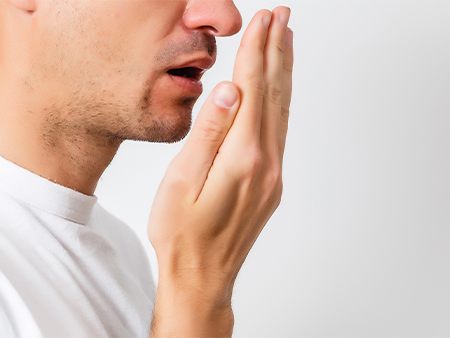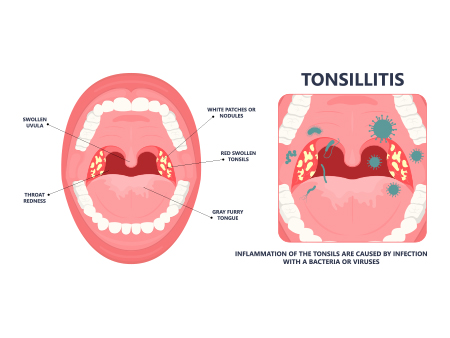Overview
Bad breath can be embarrassing, and when there is a need to talk to someone, the person can become stigmatised. People affected with bad breath have higher chances of oral health issues. This blog will briefly explain the causes and treatment for bad breath.
What is Bad breath(halitosis)?

The medical term for bad breath or oral malodour is halitosis. It is common that everyone can have bad breath due to the foods we eat. Foods like garlic, onion and spicy foods can induce bad breath in everyone.
Bad breath can lead to social embarrassment, and people become anxious. It is common to get bad breath after eating foods certain foods. If the condition does not cure on its own, it can indicate that a person has an underlying health condition.
Bad breath can also be caused due to poor oral hygiene and gastrointestinal tract problems. According to NCBI, bad breath affects about 0.5–1% of the adult population.
Bad breath or halitosis can be classified into groups.
- Delusional halitosis
- Genuine halitosis
Delusional halitosis
People affected with delusional halitosis will experience bad odour, whereas others will not experience it, including the doctor diagnosing them. The person tends to think they are affected by bad breath, which is called delusional halitosis.
According to NCBI, delusional halitosis is increasing in trend, and most people are experiencing it. Another category of delusional halitosis are people fear that they might have bad breath and become anxious when they talk.
The cause of halitosis may be due to olfactory reference syndrome if the person does not have any underlying health condition. Apart from bad breath, they also think that their armpits, feet and other body parts may also produce malodour.
Genuine halitosis
Genuine halitosis is when a person is affected with obvious malodour or bad breath. The intensity of genuine halitosis can be above the socially acceptable level, and people affected by this type will face difficulty in recovering. Genuine halitosis will affect a person psychologically.
How common is halitosis?
Halitosis is quite a common condition. Almost everyone faces this bad breath due to some reasons. The difference is that some people get bad breath after consuming foods like onion and garlic, while the other group will have an underlying condition that leads to bad breath or halitosis.
According to NCBI, nearly 50% of the population report having bad breath or halitosis due to some underlying health condition. Bad breath arises from oral or non-oral sources and differs from person to person.
Symptoms
The most common symptom of bad breath is foul-smelling breath. The smell will be so prominent that other people will notice it. This can lead to discomfort for the affected person and the other person.
Causes
The cause of bad breath can differ from one person to another. However, in most cases, it can be due to poor oral hygiene or an underlying health condition like diabetes and cystic fibrosis.
Dry mouth
A dry mouth can be one of the reasons that cause bad breath or halitosis. The body makes saliva to avoid dryness, and if the body is not producing enough saliva, it can lead to halitosis.
Dryness is mainly caused when a person smokes, and smoking also increases the risk of gum disease. Alcohol consumption can lead to dry mouth.
Gum diseases
Gum diseases can be one of the major causes of bad breath. Inflammation of gums, swelling and bleeding due to bacterial infection can also lead to halitosis.
Gum diseases can be caused due to plaque deposition or irregular brushing patterns. If left untreated, it can lead to tooth or bone loss around the teeth.
Infection in your nose, throat or lungs
Nasal or throat infections can also cause bad breath. People with pneumonia have bad breath complaints.
Diabetes
Bad breath is common in people affected with diabetes. People with diabetes have an increased risk of gum diseases like inflammation and swelling. This can be one of the causes of bad breath.
Liver kidney diseases
In healthy people, the liver and kidneys are responsible for filtering out the toxins from our bodies. But in people with malfunctioning liver and kidneys, their bodies cannot effectively filter the toxins out, which can lead to halitosis.
Sjögren’s syndrome
Sjögren’s syndrome is caused due to immune system malfunctioning. The syndrome leads to dry eyes and mouth, which is often linked to bad breath or halitosis.
GERD
GERD (gastroesophageal reflux disease) causes the backflow of stomach fluid back to the oesophagus. This can also be one of the causes of bad breath.
Tonsil stones

Tonsil stones are caused due to calcium deposits which can later develop as tonsilloliths. This can be an underlying disease cause for bad breath.
What does it mean if you have bad breath all the time?
If a person has bad breath, it can always indicate an underlying health condition that should be looked at and treated. According to NCBI, some of the common health conditions and diseases that can cause bad breath are listed below.
- Cystic fibrosis
- Acute febrile illness
- Diabetes mellitus
- Leukemia
- Hepatic failure
- Menstruation
- Renal failure
How do I know if my breath stinks?
If a person has bad breath, they will be able to notice it themself, and people around them may indicate that they have bad breath.
Treatment
The treatment for bad breath will depend on the root cause of the health issues. Bad breath can also be caused due to poor oral hygiene or underlying health like diabetes or gum diseases.
So the dentists will first examine your oral hygiene. After correcting the problems, even if the halitosis problem persists, the dentist will recommend you check for the underlying health conditions that cause it.
Supportive and Sympathetic Reassurance
If a person is not affected by any underlying condition, there will be a thorough examination of the oral cavity.
The doctor will examine the tongue biofilm, deep carious lesions or large interdental areas to check for any entrapped necrotic food debris, ill-fitted prosthesis or dentures, exposed necrotic pulp, syphilis or even malignancies like carcinoma of the cheek or tongue, mucosal lesions like tuberculosis.
The most common cause of bad breath is the deposition of tongue biofilm. The tongue biofilm deposition plays a major role in malodour, which employs bacteria and plaques.
Mouth rinses
There are many mouth rinses available to control the odour and also kill bacteria. According to NCBI, mouth rinses that contain antibacterial agent like chlorhexidine, triclosan, zinc and cetylpyridinium chloride are effective against malodour and kills the bacteria that resides in the tongue.
However, chlorhexidine can produce undesirable side effects like discolouration of teeth. There are many commercial products that are incorporated with essential oils that prevent such discolouration.
Prevention
According to NCBI, essential oils and tree oils can effectively treat or prevent bad breath.
- There is evidence that tea tree oil can effectively control malodour caused by the bacterium Solobacterium moorei.
- The reduction of bad breath has been noted in the usage of photodynamic waves from a photosensitiser.
- People with bad breath can use masking agents like mint or fluoride-flavoured toothpaste.
- Chewing gum also has considerable effects. However, the effect of chewing gum will only be brief.
- Lifestyle modifications are important to reduce or treat bad breath. Avoid smoking and the use of tobacco. Alcohol, onions, garlic, and spices in the diet should be avoided.
- Additionally, people with bad breath should increase their fluid intake. This will help them remove toxins from the body, which can control or prevent bad breath.
Brushing and bad breath
Sometimes a person’s brushing style may result in consequences like bad breath. Here are some of the tips.
Use a brush that can clean all areas of your mouth. A soft-bristled toothbrush is recommended.
Replacing your toothbrush for at least two to three months is important.
Do not use the aggressive brushing technique. It can damage the gums, which can lead to bad breath.
Hold your toothbrush at a 45degree angle and use short strokes. The brushing technique should be outside, inside, and on top of the teeth.
When should I see my healthcare provider?
If you have good oral hygiene and brushing techniques and still face bad breath problems, consult your doctor. Sometimes, the build-up of plaque can be fast for some people. So consult your dentist and schedule a regular clean-up.
Conclusion
Bad breath is a common problem, and it can cause embarrassment. Sometimes, people with bad breath can be affected by social anxiety problems, and their self-esteem may reduce.
If bad breath persists for a longer time, consult your doctor. It can also be caused due to an underlying condition.